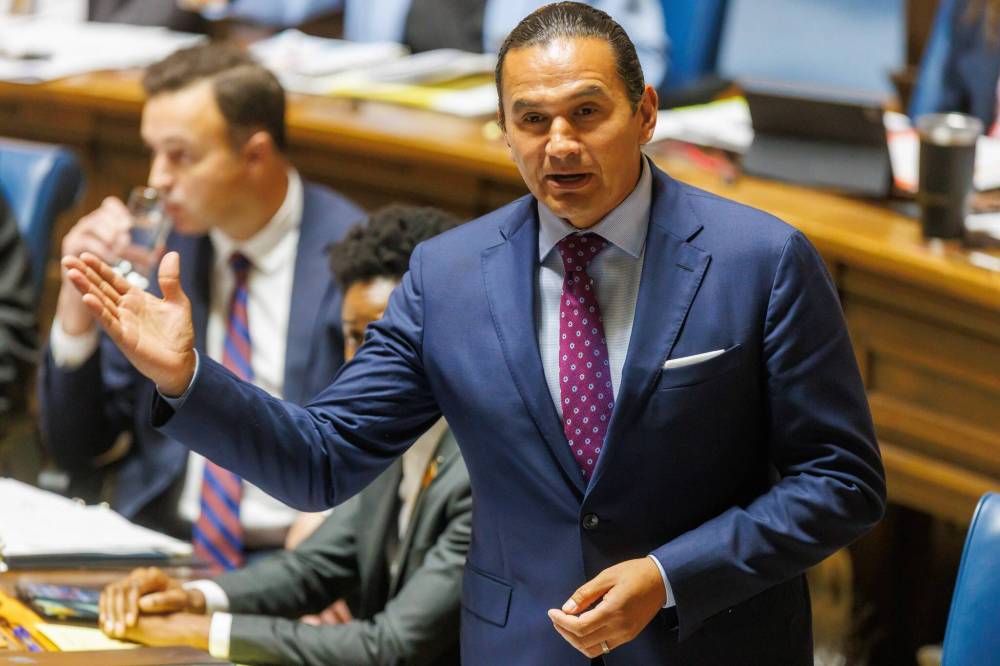Keeping forward momentum to slow drug deaths
Advertisement
Read this article for free:
or
Already have an account? Log in here »
To continue reading, please subscribe:
Monthly Digital Subscription
$0 for the first 4 weeks*
- Enjoy unlimited reading on winnipegfreepress.com
- Read the E-Edition, our digital replica newspaper
- Access News Break, our award-winning app
- Play interactive puzzles
*No charge for 4 weeks then price increases to the regular rate of $19.00 plus GST every four weeks. Offer available to new and qualified returning subscribers only. Cancel any time.
Monthly Digital Subscription
$4.75/week*
- Enjoy unlimited reading on winnipegfreepress.com
- Read the E-Edition, our digital replica newspaper
- Access News Break, our award-winning app
- Play interactive puzzles
*Billed as $19 plus GST every four weeks. Cancel any time.
To continue reading, please subscribe:
Add Free Press access to your Brandon Sun subscription for only an additional
$1 for the first 4 weeks*
*Your next subscription payment will increase by $1.00 and you will be charged $16.99 plus GST for four weeks. After four weeks, your payment will increase to $23.99 plus GST every four weeks.
Read unlimited articles for free today:
or
Already have an account? Log in here »
For the first time in five years, there is a glimmer of hope in Manitoba’s drug overdose crisis.
According to preliminary data from the Office of the Chief Medical Examiner, 203 suspected overdose deaths were recorded between Jan. 1 and June 30, 2025 — down sharply from 307 during the same period last year.
It’s the lowest mid-year total since 2021 when 183 suspected deaths were reported between January and June.

Mike Deal/Winnipeg Free Press files
Premier Wab Kinew
There were a record 570 suspected drug-related deaths for all of 2024.
This year’s progress is worth noting. After years of devastating loss, it appears some of the harm-reduction and treatment measures underway in Manitoba may be having a positive effect.
The wider availability of naloxone kits — which can reverse opioid overdoses — has undoubtedly saved lives. Increased awareness about the dangers of fentanyl and the toxic drug supply may also be helping. Expanded treatment programs have made it possible for more people to access the help they need.
The province has also added more Rapid Access to Addiction Medicine Clinics, with another one planned downtown at the former Portage Place mall.
But even with this encouraging dip, the province remains in the midst of a serious public health emergency. Two hundred and three suspected deaths in six months still represent 203 families shattered by preventable tragedy.
Caution is warranted. Overdose statistics can fluctuate for reasons that are not fully understood — from shifts in the local drug supply to temporary disruptions in trafficking routes. A six-month decline, while welcome, may not indicate a lasting trend.
That’s why now is not the time to declare victory. It’s time to double down.
The provincial NDP government has taken some positive steps since taking office in 2023 — expanding addiction treatment capacity, increasing access to mental health supports and emphasizing harm reduction.
But one major promise remains unfulfilled: the creation of Manitoba’s first supervised drug consumption site.
More than two years after Premier Wab Kinew pledged to open one, there’s still no announced location or timeline.
That delay is unacceptable. Supervised consumption sites save lives. They provide users a safe space to use drugs under medical supervision, drastically reducing the risk of fatal overdose. They also connect people to treatment and social services, helping move them toward recovery.
If this recent decline in overdose deaths is to mean anything, it must serve as a foundation for real, sustained change. That means not just announcing a supervised consumption site, but actually opening it — and soon.
It means ensuring naloxone kits remain widely available. It means increasing public education about the toxic drug supply and supporting frontline organizations that meet people where they are, without judgment.
It also means tackling the root causes of addiction — poverty, trauma, mental illness and social isolation — with the same urgency we bring to treating its symptoms.
The Kinew government has shown compassion and pragmatism on this file, but good intentions must translate into action. Manitoba has an opportunity to build on this fragile improvement and turn a short-term decline into a long-term reduction in preventable deaths.
The alternative — to wait, to study, to delay — is to risk losing the momentum and falling back into the deadly patterns of recent years.
Each of those 203 deaths so far this year represents not just a statistic, but a son, daughter, friend or neighbour. They are a reminder of the human cost of inaction, and a call to push harder for the kind of bold, evidence-based policies that can truly save lives.
The latest numbers offer hope — but hope alone won’t end this crisis. Action will. And we need more of it.


